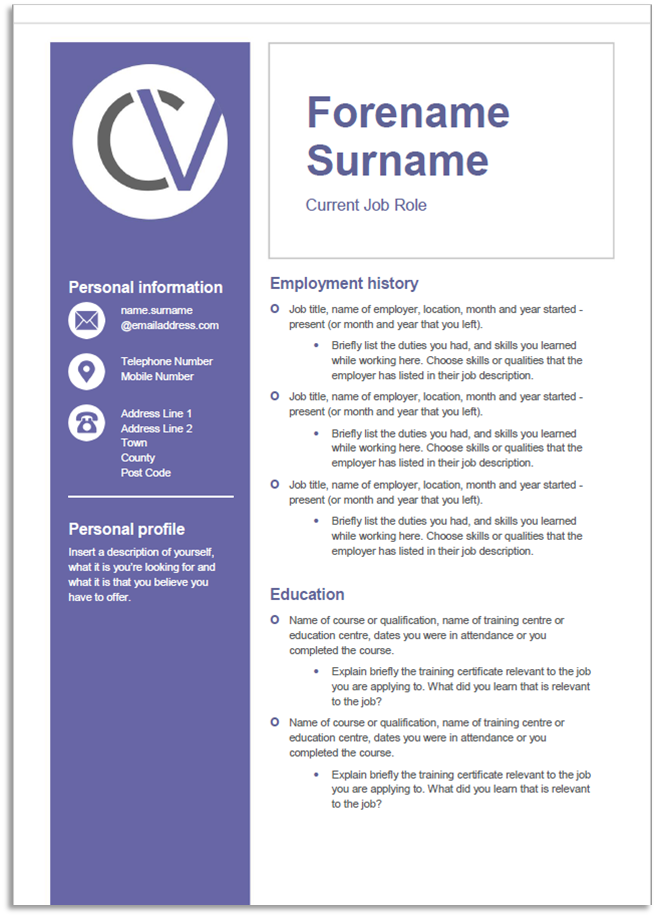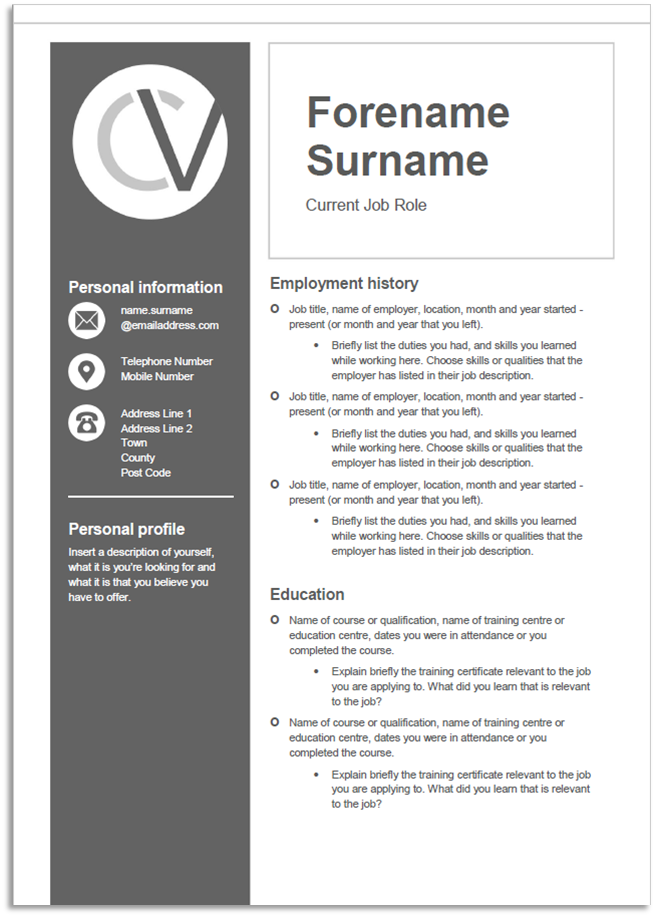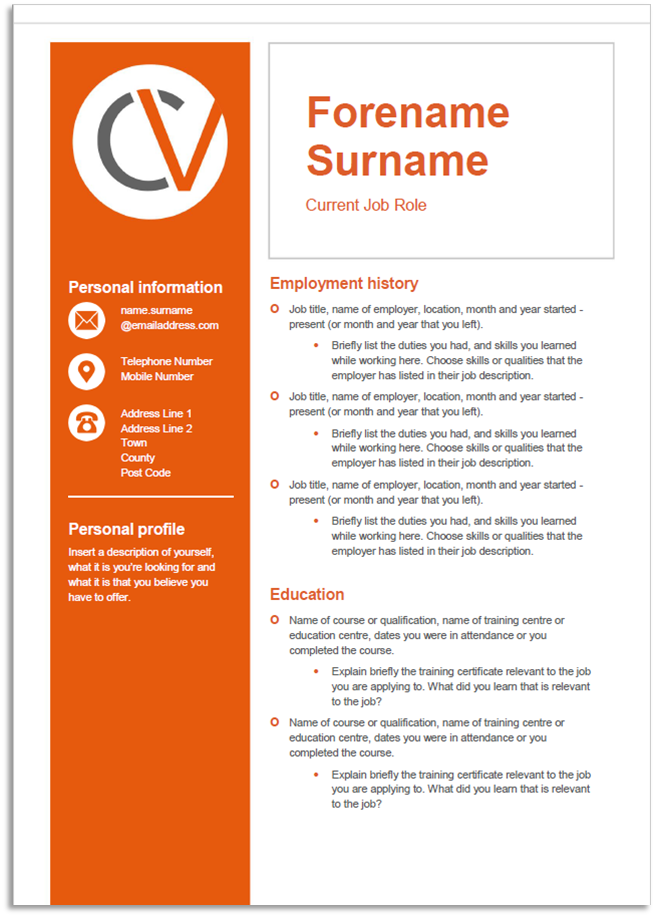You’re spoilt for choice when working as an administrator, as you can work in nearly any job sector. Whether it be for a retail business, transport company, hospital or school, you’ll be the one making sure all administrative duties are taken care of.
To land a job as an administrator, your CV will need to show that you’re highly organised, have strong computer skills and are able to work well as part of a team.
Whether you're looking to start your career in administration or take that next step up the career ladder, our free CV template is tailored to ensure your CV stands out from the crowd.
A guide to writing a CV for a job as an Administrator
FIRST AND SECOND NAME
Home number | Mobile number
Emailaddress@email.com
Home address, Home Street
Home Town
Postcode
Personal Profile
In the personal profile, you should professionally introduce yourself, in three or four sentences, with relation to the job you’re applying to.
Try to include: your current work situation, what type of work you are searching for (such as part-time, flexible hours, or full-time employment starting immediately) some key skills, traits or key achievements that will show you're the perfect fit for the advertised job.
EXAMPLE:
I am a highly organised individual with great communication and interpersonal skills, and have three years’ experience working as an administrator. I have strong typing and data entry skills, and enjoy working independently as well as in a team.
Work History
The work history section is to show the potential employer what jobs or work experience you’ve done. It is the first chance for you to highlight the skills and experience each one has given you, and this is turn should show the potential employer why you are perfect for the job you’re applying for. You don’t need to include every last detail, just pick out any key achievements or times you went above and beyond your role. You can always write down and save your examples or other relevant skills for the interview.
Try to include your work history for the last five years. If you haven’t been working for that long, that is okay. It will be explained by the education history. If you have recently moved to the country, it’s okay to include employment in other countries. There is more advice on work and education history in our CV tips article.
- Job title, name of employer, location, month and year started – present (or month and year that you left)
- Briefly list the duties you had, and skills you learned while working here. Choose skills or qualities that the employer has listed in their job description
EXAMPLE:
- Administrator, HR department at HSBC, London, October 2017 – present
- My duties include updating current employees details on file, in addition to issuing, chasing up and inputting new employees’ details. I also set up interview meeting rooms for managers and prospective employees, and screen some of the general emails and phone calls to the department
What jobs should you include?
- Any jobs you’ve had in the administrative and secretarial sector will be useful to include here as lots of the skills will overlap and show you’re a good candidate for the role.
- If you have recently left education, or are new to this type of work, try to include any jobs you’ve had that will highlight the skills the employer is looking for. For example, if you have worked on the reception desk in a school, use this to show that you have developed a good telephone manner, paperwork organisation and the ability to prioritise your workload.
Education History
In education history, this is a chance to show any relevant training you have done, what skills you have learned from your courses, as well as general education subjects you’ve done. As you get more work experience, this section will become shorter, as your work history becomes more relevant and more recent.
You don't need any formal qualifications for most administrator roles, although employers will expect you to have a good level of English and Maths. So any GCSEs or college courses should be listed here. Any business related qualifications should also be listed, as this will help your application.
- Name of course or qualification, name of training centre or education centre, dates you were in attendance or you complete the course
- Explain briefly the training certificate relevant to the job you are applying to. What did you learn that is relevant to the job?
EXAMPLE:
- Microsoft Office Plus Diploma, Pittman Training, Holborn, August 2016
- Covered the key areas of MS packages including word, outlook, excel, powerpoint and access, as well as two elective courses in excel expert and effective business communication
If you have completed courses or gained certificates in other work-related areas, or first aid, include that information here.
Skills
Here is your chance to highlight the best skills you have in relation to the job you’re applying for. Hint: these will be the skills listed in the job advert, but only highlight the skills you have. Misleading information on your CV is likely to trip you up in an interview and is unprofessional; you don’t have to show you have every last skill listed in the job advert to be successful.
EXAMPLE:
- Communication skills – ‘Through working with a wide variety of employees I have learned how to improve my verbal and written communication. Making sure information is fully understood and passed on effectively.’
- Organisation – ‘I have improved my ability to sort through electronic and paper files, and systematically process them. I have also been able to improve one of the systems used by my team to help workflow and efficiency.’
References
First and last name
Job title and relation to you in the work place (if it isn’t obvious from the job title), name of work place, work contact number (or main company phone number which they can be reached through) and work email address
EXAMPLE:
Susan Crane
Manager at HSBC
0000 0000 00
SusanCrane@email.com
Who should you include as a reference?
- Your first reference should ideally be from a senior colleague or manager who you’ve been working closely with in your most recent role. The second reference can be from a current colleague, or line manager or supervisor from a previous job. It’s best practice to ask someone if they will be a reference for you before they are contacted. Be aware that not all employers actually contact references, but it’s important to have them available if needed.
- It’s important to remember that while you are in your current job, consider that you may not want your reference (eg. your current boss) to be contacted until you have had an interview for a new possible job, or are actually offered it. This is because, for instance, if you weren’t offered the new job, and end up staying in your current job then you might not want your manager having been contacted as a reference. It can cause tension or awkward conversations about why you were trying to leave. A good way to get around this is to simply write ‘References available on request’. This shows the new employer that they can ask you for them as needed, but also means you can ask them to only contact them if you are offered the job, and then have time to ask the reference if it’s okay for them to be contacted. Most potential employers will be happy to wait to do this after offering you the job
- If you have only had one previous job, or have been studying, it is okay to include a tutor as a reference, or someone else as a character reference (who is not related to you)





